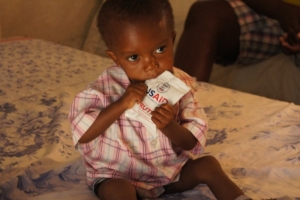USAID in Angola: Impacting Poverty
 Angola is not inherently an impoverished country; however, it has been significantly affected by a tumultuous history marked by slavery and civil conflict. These historical injustices have led to widespread inequality and left a substantial portion of the population living in precarious conditions. The United States Agency for International Development (USAID) is the principal government agency responsible for international development and humanitarian assistance. USAID plays a vital role in Angola by providing support aimed at fostering sustainable development, improving health outcomes and enhancing economic opportunities for its citizens.
Angola is not inherently an impoverished country; however, it has been significantly affected by a tumultuous history marked by slavery and civil conflict. These historical injustices have led to widespread inequality and left a substantial portion of the population living in precarious conditions. The United States Agency for International Development (USAID) is the principal government agency responsible for international development and humanitarian assistance. USAID plays a vital role in Angola by providing support aimed at fostering sustainable development, improving health outcomes and enhancing economic opportunities for its citizens.
Historical Background
Since 1992, USAID has been engaged in relief and development programs in Angola, initially focusing on immediate health interventions like immunization campaigns and emergency feeding. Following the end of the civil war in 2002, Angola made strides in rebuilding its infrastructure and economy. However, challenges such as poverty, inadequate health care and limited education remain. In response, USAID expanded its efforts to address these critical areas for recovery. By 2011, USAID celebrated its 50th anniversary and 15 years in Angola, providing support across agriculture, economic growth, health and governance.
Health Care Assistance
USAID’s health programs in Angola focus on improving health care services and addressing high maternal and child mortality rates. Collaborating with the Government of Angola (GRA) and various stakeholders, USAID supports initiatives like the President’s Emergency Plan for AIDS Relief (PEPFAR) and the President’s Malaria Initiative (PMI) to combat malaria, HIV/AIDS and other communicable diseases in the nation.
Despite these efforts, Angola faces significant health challenges, with nearly one in five children dying before age 5 and a maternal mortality ratio of 199 deaths per 100,000 live births. The country also has a high fertility rate of 5.8 births per woman, straining health care resources. The Angolan National Health Development Plan (2012-2025) aims to reduce malaria morbidity from 21% to 12%, maintain HIV/AIDS prevalence at 2%, triple the number of doctors per 10,000 citizens, improve skilled birth attendance from 49% to 70% and increase access to family planning services from 6% to 45%.
Food Assistance
Angola is highly vulnerable to recurring climatic shocks, such as droughts and floods, which have severely limited agricultural production and exacerbated food insecurity. Moreover, inadequate access to safe drinking water and essential health care services has led to increased morbidity and mortality rates. According to the World Food Program (WFP), as of September 2021, more than 1.3 million people in the Cunene, Huíla and Namibe provinces required emergency food assistance.
In response to this crisis, U.S. Ambassador Tulinabo S. Mushingi issued a redeclaration of humanitarian needs on November 29, 2022, highlighting the widespread food insecurity affecting the country. In light of these challenges, USAID continues to provide critical support in food, nutrition, water, sanitation and hygiene assistance to improve food security and nutrition outcomes for at-risk populations in Angola.
Environmental Protection
USAID’s Regional Environmental Activities prioritize the conservation and sustainable management of the Cubango-Okavango Basin, one of Africa’s most biodiverse ecosystems, which supports more than one million people who depend on its water for drinking, fishing, agriculture and tourism. However, changes in land use, water diversion and urbanization threaten these unique ecosystems and their vital resources. In response, the Ecosystems, Communities and Climate – Cubango-Okavango (ECCO) initiative has been launched, funded by USAID and bolstered by private sector support.
This initiative focuses on enhancing community governance of water and sanitation services while promoting cross-sector collaboration for biodiversity conservation. USAID’s efforts in Angola also include supporting national forest inventories, implementing community forestry pilot projects, conducting fire management capacity assessments and evaluating Angola’s protected area network. These initiatives complement regional programs aimed at safeguarding Angola’s natural resources, enhancing economic opportunities and promoting sustainable development across Angola, Namibia and Botswana.
Economic Development
Furthermore, USAID has developed a five-year Country Development Cooperation Strategy (CDCS) that acknowledges Angola’s growing economy, rising regional status and ongoing development challenges. This strategy aims to transition Angola from a donor-recipient relationship to a partnership model, where the country will take the lead in financing and managing its economic and social development with targeted technical assistance from USAID.
Recognizing agriculture as the backbone of the economy, USAID fosters economic growth and trade by mobilizing private sector investments. Collaborating with companies like ExxonMobil and Azule Energy, USAID supports rural women farmers through initiatives that enhance land rights, literacy and agricultural productivity, such as the Women in Angola Farming project. Additionally, USAID’s Africa Trade and Investment program under the Prosper Africa initiative boosts trade and investment between Africa and the U.S., addressing energy poverty and promoting sustainable innovation.
Conclusion
The USAID program in Angola represents a commitment to supporting the country’s development journey. Through targeted interventions in health care and food assistance, environmental protection and economic development, USAID has made a positive impact on the lives of many Angolans. Continued collaboration between the U.S. government, Angolan authorities and local communities will be essential to address ongoing challenges and promote sustainable development in the years to come.
– Hoi Ieng Chao
Hoi Ieng Chao is based in Macau and focuses on Global Health for The Borgen Project..
Photo: Flickr
